|
|
|
Sort Order |
|
|
|
Items / Page
|
|
|
|
|
|
|
| Srl | Item |
| 1 |
ID:
118176
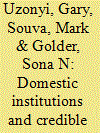

|
|
|
|
|
| Publication |
2012.
|
| Summary/Abstract |
Audience costs are a central feature of many prominent theories of international conflict. We advance the understanding of audience costs by specifying the domestic institutions necessary to generate them. In our conceptualization, audience cost capacity (ACC) is a function of the availability of alternative rulers and the cost of mobilizing against the incumbent. This conceptualization leads to the first measure of ACC that has variation between more and less democratic political systems and variation within autocracies. We subject our measure to a rigorous set of tests that includes addressing selection effects and temporal treatment effects, neither of which have been fully examined in this research area. The empirical analysis offers strong support for the validity of our measure.
|
|
|
|
|
|
|
|
|
|
|
|
|
|
|
|
| 2 |
ID:
181163
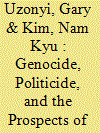

|
|
|
|
|
| Summary/Abstract |
Why do some autocracies democratize? A country’s violent past has received little attention. We argue that genocide and politicide undermine democratization by binding the elites’ supporters more tightly to the governing power, while cementing in-group/out-group animosities, and helping preserve the elites’ status quo position within the state. We test this argument on a new dataset of government atrocity and democratization since 1900. These novel data allow us to capture many important instances of atrocity missed by others, and thus take a longer look at democratization and violence throughout history. We find that episodes of genocide and politicide are associated with a lower likelihood of democratization in both the short and long run. These effects are larger and more consistent than other common explanations for democratization. They also differ from the effects of non-genocidal civil war violence.
|
|
|
|
|
|
|
|
|
|
|
|
|
|
|
|
| 3 |
ID:
172055
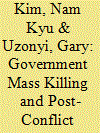

|
|
|
|
|
| Summary/Abstract |
Why do some countries implement trials to punish perpetrators of state-sponsored mass killing during civil war? A common explanation is that domestic and international demand for justice pressures the government to implement trials. However, this demand is unlikely to produce prosecutions because state-sponsored violence during fighting provides elites incentive to conceal information after war. The revelation of information concerning the government's atrocities could result in renewed domestic instability or international sanction. Therefore, a government that has committed atrocities during the civil war, and emerges victorious from the conflict, should be unlikely to pursue trials in the aftermath of the war.
|
|
|
|
|
|
|
|
|
|
|
|
|
|
|
|
| 4 |
ID:
157362
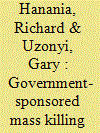

|
|
|
|
|
| Summary/Abstract |
Why do civil wars reoccur? Some scholars emphasize the role of post-war factors, while others locate the causes of civil war recurrence in the dynamics of the conflicts themselves. We build a theory that bridges these arguments by focusing on mass killing. We argue that government mass killing during war reduces opportunities for the opposition to return to military conflict in the future. This allows for longer periods of post-conflict peace. However, government atrocities that begin after the end of a civil war create new grievances without diminishing the ability of opponents to fight. This makes a faster return to conflict more likely. Statistical analysis of all civil wars between 1946 and 2006 strongly supports our arguments, even when we account for selection effects regarding when governments are more likely to engage in mass killing. These results reveal that both during-war and post-war tactics influence civil war recurrence, but that the same tactic can produce different effects depending on the timing of its use.
|
|
|
|
|
|
|
|
|
|
|
|
|
|
|
|
| 5 |
ID:
160534
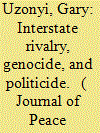

|
|
|
|
|
| Summary/Abstract |
Interstate rivalry not only influences a country’s international behavior, but also its domestic conduct. Here, I focus on the connection between interstate rivalry and domestic government mass killing, specifically genocide and politicide. I argue that interstate rivalry has both direct and indirect influences on a government’s decision to use mass violence against its civilian population. Directly, countries engaged in rivalry experience a heightened state of military tension, which increases the likelihood that the country will resort to political mass killing when handling domestic dissent. Indirectly, rivalry increases the likelihood of both inter- and intrastate conflict, which also increases the likelihood of genocide and politicide. Statistical analysis of all country-years from 1955 to 2011 reveals that interstate rivals are more likely to engage in genocide and politicide than are other states. This research illustrates the way in which interstate rivalry influences a state’s domestic politics and shapes the interactions between government and population. It also highlights the importance of how the international threat environment affects a state’s willingness to engage in domestic political mass murder. These findings indicate that rivals do not only engage in the most violent interstate behavior, but also some of the deadliest domestic politics, as well.
|
|
|
|
|
|
|
|
|
|
|
|
|
|
|
|
| 6 |
ID:
142041


|
|
|
|
|
| Summary/Abstract |
Why do states participate in United Nations peacekeeping missions? Extant theory revolves around two benefits states derive from participation: the financial benefits participants receive for their contributions and the ability to further liberal norms abroad. Yet, these theories have received limited empirical support. In addition, they cannot explain where and when leaders send troops. To rectify these limitations, I focus on a more straightforward benefit states receive from limiting conflict and providing stability to war-torn regions. Namely, stabilizing conflict areas helps stem the externalities caused from ongoing conflicts, such as refugees. This explanation of participation in peacekeeping predicts who is most likely to send support (those fearing refugee inflows), the size of contribution (increasing relative to the inflows), and where they send assistance (to the specific conflict area producing the externalities). Statistical analysis of all UN peacekeeping missions since 1990 provides support for this argument and reveals that refugee flows better predict who is likely to contribute troops, and to what conflict, than the size of those contributions. While other realpolitik considerations strongly influence which states participate in UN peacekeeping, neither democracy nor state need is a statistically significant explanator of who contributes. However, state need does predict the size of contribution.
|
|
|
|
|
|
|
|
|
|
|
|
|
|
|
|
| 7 |
ID:
156618


|
|
|
|
|
| Summary/Abstract |
Scholarship explores the impact of human rights abuse and state repression on terrorism. Heretofore, scholarship has ignored the impact of government-sponsored killings on domestic terrorism. This article proposes that mass killings create a focal point for terrorist mobilization. The vendetta agenda fuels violence by animating retributory violence. Additionally, mass atrocities create a permissive environment for violent nonstate activity. A spiral of violence ensues whereby groups resort to terrorism. Utilizing data from the Global Terrorism Database, 1971–2011, the study shows that mass killings significantly increase domestic terrorism. It contributes to emerging scholarship examining how state policies influence terrorist activity.
|
|
|
|
|
|
|
|
|
|
|
|
|
|
|
|
|
|
|
|
|